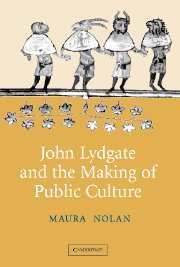Book contents
- Frontmatter
- Contents
- Acknowledgments
- Introduction: the forms of public culture
- 1 Tragic history: Lydgate's Serpent of Division
- 2 Social forms, literary contents: Lydgate's mummings
- 3 Tragedy and comedy: Lydgate's disguisings and public poetry
- 4 Spectacular culture: the Roman triumph
- Bibliography
- Index
- CAMBRIDGE STUDIES IN MEDIEVAL LITERATURE
1 - Tragic history: Lydgate's Serpent of Division
Published online by Cambridge University Press: 22 September 2009
- Frontmatter
- Contents
- Acknowledgments
- Introduction: the forms of public culture
- 1 Tragic history: Lydgate's Serpent of Division
- 2 Social forms, literary contents: Lydgate's mummings
- 3 Tragedy and comedy: Lydgate's disguisings and public poetry
- 4 Spectacular culture: the Roman triumph
- Bibliography
- Index
- CAMBRIDGE STUDIES IN MEDIEVAL LITERATURE
Summary
This is the final and insurmountable limit of literary invention. A writer can and should invent a great deal. He cannot invent the realistic core of a tragic action. We can weep for Hecuba. One can weep for many things. Many things are sad and melancholy. But tragedy originates only from a given circumstance which exists for all concerned – an incontrovertible reality for the author, the actors and the audience. An invented fate is no fate at all.
(Carl Schmitt, “The Source of the Tragic”)One of the most puzzling of Lydgate's works is Serpent of Division, a short prose tract written in 1422, recounting the life of Caesar and describing the terrible consequences of political and social division. At first glance, the text appears to be an ideal object for historical analysis; written at a critical moment in Lancastrian history just after the death of Henry V, it narrates the rise and fall of a brilliant military leader as a warning to “lordes and prynces of renowne” of the “irrecuperable harmes” (66, line 19, line 2) of political and social division. The allegorical logic of the text is difficult to ignore, as is Lydgate's insistence on a resolutely moral reading of both “division” and Caesar himself. Indeed, a simple historical reading arguing that Lydgate uses the exemplum as a means of negotiating the crisis produced by the death of the monarch seems to be what the text itself demands.
- Type
- Chapter
- Information
- John Lydgate and the Making of Public Culture , pp. 33 - 70Publisher: Cambridge University PressPrint publication year: 2005



